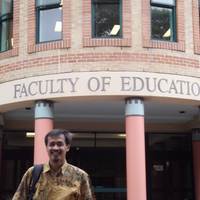Books by Ana Maria Navas Iannini

https://www.routledge.com/Controversy-in-Science-Museums-Re-imagining-Exhibition-Spaces-and-Practice/Pedretti-Navas-Iannini/p/book/9781138579972, 2020
Controversy in Science Museums focuses on exhibitions that approach sensitive or controversial to... more Controversy in Science Museums focuses on exhibitions that approach sensitive or controversial topics. With a keen sense of past and current practices, Pedretti and Navas Iannini examine and reimagine how museums and science centres can create exhibitions that embrace criticality and visitor agency.
Drawing on international case studies and voices from visitors and museum professionals, as well as theoretical insights about scientific literacy and science communication, the authors explore the textured notion of controversy and the challenges and opportunities practitioners may encounter as they plan for, and develop, controversial science exhibitions. They assert that science museums can no longer serve as mere repositories for objects or sites for transmitting facts, but that they should instead become spaces for conversations that are inclusive, critical, and socially-responsible.
Controversy in Science Museums provides an invaluable resource for museum professionals who are interested in creating and hosting controversial exhibitions, and for scholars and students working in the fields of museum studies, science communication, and social studies of science. Anyone wishing to engage in an examination and critique of the changing roles of science museums will find this book relevant, timely and thought-provoking.
O livro é mais um convite a educadores para assumirem e compartilharem conosco um olhar reflexivo... more O livro é mais um convite a educadores para assumirem e compartilharem conosco um olhar reflexivo, crítico e comprometido com uma perspectiva de ciência que rompe com visões dogmáticas, a-históricas e neutras, e assume a ciência como um empreendimento humano, posicionado, ideológico, político e, por isso, uma construção social. É um convite para parar – e reparar!
a democratização do acesso a bens e espaços culturais tem sido cada vez mais discutida no cenário... more a democratização do acesso a bens e espaços culturais tem sido cada vez mais discutida no cenário atual brasileiro. Estamos progredindo com relação a diversos aspectos de desenvolvimento social e o acesso à cultura precisa acompanhar este movimento. E é este, justamente, um dos principais objetivos do projeto "Que público é esse? Formação de públicos de museus e centros culturais", que disponibiliza a educadores conhecimento para exercerem com mais propriedade o papel de mediadores culturais. Quando devidamente preparados, os profissionais da educação são aliados fundamentais para qualificar e facilitar o contato do público com conteúdos que, muitas vezes, se valem de códigos e linguagens sofisticados e específicos.
Book chapters by Ana Maria Navas Iannini
Critical Voices in Science Education Research Narratives of Hope and Struggle, 2019
Navigating the Changing Landscape of Formal and Informal Science Learning Opportunities, 2018
Papers by Ana Maria Navas Iannini
Museu: lugar do público., 2009
Proceedings of the 2023 AERA Annual Meeting
Journal of Science Communication
This paper examines how a particular subset of informal science education settings — science exhi... more This paper examines how a particular subset of informal science education settings — science exhibitions — embraces contemporary socioscientific issues (SSI) and fosters public engagement with them. A qualitative cross-case analysis of two SSI exhibitions about teen pregnancy (Brazil) and sustainability (Canada) was conducted. It revealed complex issues around operational funding, and institutional tensions related to the nature, balance, and relevance of the topics displayed. The analysis unravelled opportunities for SSI exhibits to engage with contextualized and situated knowledge; articulate the deficit model with other models of science communication; and consider visitors as agents of change.
Proceedings of the 2023 AERA Annual Meeting
Proceedings of the 2020 AERA Annual Meeting
Proceedings of the 2019 AERA Annual Meeting

Critical Voices in Science Education Research, 2019
In this chapter, I use the currere process of reflexive inquiry (PinarWF, AnnMeetAmEducResAssoc2:... more In this chapter, I use the currere process of reflexive inquiry (PinarWF, AnnMeetAmEducResAssoc2:19–27, 1975), as a personal experience method (Grumet MR, JTeachEduc40:13–17, 1989) to map my intellectual interests about science museums and make meaning of them. Moving through the four moments of inquiry that Pinar describes − regressive, progressive, analytical, and synthetic −, I start with a turn to my autobiographical past, looking closely at undergraduate, graduate and professional experiences that first opened a space for me to combine science and education, and then, to approach (and question) the work of science museums. Places, people, feeling and emotions emerged as part of this reconstruction. In taking distance of the past, I move within the other moments of inquiry. I look at the positions that ground my current doctoral research with museum exhibits that disrupt dominant cultural narratives and prevailing models of science communication. As part of this process, I reflect on the ways I have strengthened and refined my epistemological beliefs and my understandings about the challenges and possibilities to envision (and to advocate for) science museums as places for promoting social change. While identifying relations between intellectual interests and biographical movement, I explore potential angles for future research and, also, possibilities for combining theory and practice.
Controversy in Science Museums, 2020
Controversy in Science Museums, 2020
International Journal of Science Education, Part B, 2022











Uploads
Books by Ana Maria Navas Iannini
Drawing on international case studies and voices from visitors and museum professionals, as well as theoretical insights about scientific literacy and science communication, the authors explore the textured notion of controversy and the challenges and opportunities practitioners may encounter as they plan for, and develop, controversial science exhibitions. They assert that science museums can no longer serve as mere repositories for objects or sites for transmitting facts, but that they should instead become spaces for conversations that are inclusive, critical, and socially-responsible.
Controversy in Science Museums provides an invaluable resource for museum professionals who are interested in creating and hosting controversial exhibitions, and for scholars and students working in the fields of museum studies, science communication, and social studies of science. Anyone wishing to engage in an examination and critique of the changing roles of science museums will find this book relevant, timely and thought-provoking.
Book chapters by Ana Maria Navas Iannini
Papers by Ana Maria Navas Iannini
Drawing on international case studies and voices from visitors and museum professionals, as well as theoretical insights about scientific literacy and science communication, the authors explore the textured notion of controversy and the challenges and opportunities practitioners may encounter as they plan for, and develop, controversial science exhibitions. They assert that science museums can no longer serve as mere repositories for objects or sites for transmitting facts, but that they should instead become spaces for conversations that are inclusive, critical, and socially-responsible.
Controversy in Science Museums provides an invaluable resource for museum professionals who are interested in creating and hosting controversial exhibitions, and for scholars and students working in the fields of museum studies, science communication, and social studies of science. Anyone wishing to engage in an examination and critique of the changing roles of science museums will find this book relevant, timely and thought-provoking.